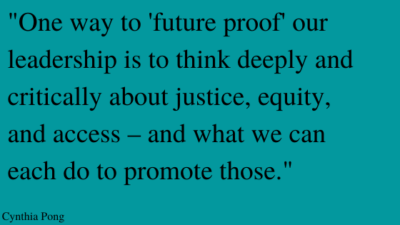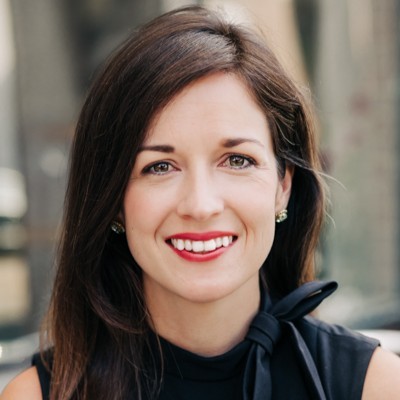Future Proofing Your Leadership

Spend 5 minutes in a high school parking lot, and you’ll see a minimum of three cars with a YOLO (you only live once) bumper sticker on the back. Life is short. I’m not here to remind you of that. While it is certain that we are not promised a tomorrow, I am confident that if tomorrow comes, it will be different than today. Change is inevitable.
There are a lot of great resources available on the Future of Work by think tanks like the McKinsey Global Institute or thought leaders like Heather McGowan. We are learning that in order to succeed in the #futureofwork, employees need to develop an agile approach to business, learn to collaborate virtually, own our own learning, and adopt an intrapreneurial mindset about work.
But what about the future of leadership? Why aren’t we talking about that too? If the work is going to be different, and employees are going to have to adjust— won’t leadership look different as well?
I connected with Cynthia Pong; an NYU-trained ex-lawyer turned leadership and career coach about this topic. Cynthia’s work has been featured in Supermaker, FastCompany, Refinery29, HuffPost, Monster, and more, and she was a LinkedIn Top Voice of 2019. One focus of her coaching is preparing professionals (specifically women of color) for the future of work.
Sarah: Cynthia, I don’t know your whole story, but what I do know is interesting–it’s beautifully non-linear. How did you find yourself in coaching?

Cynthia: Why thank you! Interestingly enough, I started out – and still technically am – a lawyer. I went to law school to become a public defender and was thrilled to get a job doing criminal defense work in the Bronx, NYC, after law school. But I started burning out a few years in and ended up leaving the field and the law after six years.
After leaving, I got it in my head that I wanted to work for myself and start my own business. At first, I set out to be a consultant helping nonprofit and social justice organizations build more positive workplace culture and streamline operations. It sounded great, but after six to eight months of trying to break into the industry and not getting any paid work, it was clear that that wasn’t going to work!
So I had to pivot my business a few times in the next year or so, and in late 2016 – as yet another experimental pivot – I put out a message on Facebook to say I was considering taking on clients in an individual coaching capacity, first session is free, sign up at this link. I got a few sign-ups, two clients, and the rest, as they say, is history!
Future-Proofing Leadership
Sarah: We are both passionate about equipping the next generation for the future of work. We both teach our clients that future-proofing your career means adopting a growth mindset, taking ownership of your own development, and remaining agile. But what about future proofing your leadership? What does that even mean?
Cynthia: Fascinating question. I think future-proofing your leadership is very similar to future-proofing your career, in that it involves those same things – adopting a growth mindset, taking ownership of your own development, and staying agile.
To me, future-proofing your leadership means doing your work to be at the forefront of change and anticipating what kind of leaders will be needed in the future, based on developing trends. It requires us to imagine and project into the future and to have a vision of the world we want to see – that’s not merely more of the same. Change is inevitable.
Concretely, future-proofing your leadership means asking yourself what your vision of the future is. It might mean writing a leadership mission statement for yourself. It will definitely require the courage to do things and take steps that others aren’t willing to take, in service of your vision of the future.
One way to “future proof” our leadership is to think deeply and critically about justice, equity, and access – and what we can each do to promote those.
That means thinking about how we can be better allies to each other – and especially to those who have less privileged than we do. How can we make room for, create opportunities for, and lift up people who don’t have the same level of access that we do? How can we hire, retain, and promote people of color on our teams and in our organizations? How can we create a greater sense of belonging in our workplaces and communities so that those who’ve historically felt left out can bring their whole selves?
I’m just coming off speaking at LinkedIn’s TransformHER2020 and, at different points during the one-day event; people talked about what true allyship is. Caroline Fairchild used the term “white woman of privilege,” when describing her own identity in moderating a panel on allyship. Jason Rosario talked about how allyship is a body of work, a set of actions taken over time – not simply a title one can claim for oneself.
These are two examples (acknowledging privilege and a call-to-action to consistently take action, respectively) that demonstrate the kind of leadership that will carry us into the future, and a very positive one.

Important Skills for the Future of Work
Sarah: What skills and behaviors do you think are important in the leaders of the future?
Cynthia:The ability to pause and think deeply and critically. In the age of social media, the 24-hour news cycle, and in a culture of instant gratification, the ability to shut out the noise and really think is increasingly important. Speed and knee-jerk reactions are not going to solve the world’s biggest problems. We need people who can really be thoughtful, empathetic, and creative. And the prerequisite for all of those is setting aside time and energy.
Beyond that, I think effective communication skills are crucial. And the ability to admit when we don’t know when we need help, and to hire and bring others in (whether as partners, consultants, or team members) to bridge a gap in knowledge or skill.
Sarah: What can readers do now to prepare to lead the next generation?
Cynthia:Try to gain a deeper understanding of what your role is in building a more positive, just, and equitable world for everyone. Read about race, privilege, and power. Take unconscious or implicit bias trainings.
Continue to strengthen your communication, problem-solving, and creative-thinking skills. Strengthen your emotional intelligence. Plus everything I mentioned working on!
Skills Needed for Managing a Remote Workforce
Sarah: Technology has changed the way we work. When I first started working in corporate America, I literally knew no one who worked remotely. Fast-forward to today, I now work out of a home office and have clients globally thanks to technology. As work has evolved from the traditional 9-5 to flexible hours, employees are also demanding flexible working conditions. In fact, according to FlexJobs, between 2005 to 2017, there was a 159% increase in remote work with 70% of people working remotely at least once a week (stat). In my opinion, the demand for remote opportunities will only grow. What do you think the key skills leaders need to develop to effectively manage the future remote workforce?
Cynthia:This is precisely the kind of trend that we should be thinking about in order to future proof our leadership! Having sharp problem-solving skills are absolutely imperative here. And the increasing trend of remote work isn’t a problem, necessarily, but it does pose a challenge in that it’s something relatively new and different.
To illustrate. If your goal as a leader is to build community, cohesion, and alignment among your staff and team, what do you do if everyone’s working on different schedules in different communities? If your goal is to be as effective a leader for people of color as for white folks, how do you make sure your management decisions aren’t affected by unconscious bias when you don’t have built-in in-person time with everyone and people may have different communication styles by race and gender?
This is what leaders need to be able to do: anticipate and identify problems, and then know how to approach solving them creatively and constructively. The most effective problem-solving will likely involve strategic experimentation, calculated risks, and iteration.
Sarah: As a followup question, Harvard Business Review did a small study of successful leaders and identified 10-traits of innovative leaders. #4 on the list was “ builds a climate of reciprocal trust” What are some ways that leaders can build “reciprocal trust” in online or remote environments?
Cynthia:Oooh, I love this question. Transparency is huge. Being open about processes, timelines, and substantce can go a long way in establishing reciprocal trust – especially when we don’t have the ability to build trust in-person.
Being clear and consistent is also crucial. Your team doesn’t have to be able to predict all the specifics of what you’d do or say in a particular situation, but they do need to know that you will respond clearly, consistently, and respectfully, take their concerns seriously, and won’t betray their trust.
Also, being compassionate and empathetic – it’s important to be able to understand what someone else needs in order to trust you.
Last but not least, having a strong sense of integrity. This will come out through your actions and leadership (so will a lack thereof). So always be strengthening your integrity.
Cynthia’s Best Career Advice
Sarah: What is the best career advice you’ve ever been given? Did you take it?
Cynthia: You can’t fast forward experience! I was told this at an intensive training program for criminal defense lawyers that I went to when I was about 30 at the time. I remember being in a huge rush to know everything about how to do my job and wishing that the process was like Keanu Reeves in The Matrix getting all the knowledge about a particular subject downloaded into his brain in seconds. But this advice was a beautiful reminder to me to 1) enjoy the process of learning and growing and 2) be easier on myself when I inevitably make mistakes or don’t know how to do something!
Want to learn more about Cynthia? Follow her on LinkedIn, sign up for her newsletter, The Trajectory and stay tuned…. Cynthia has a lot of big projects in the works!

